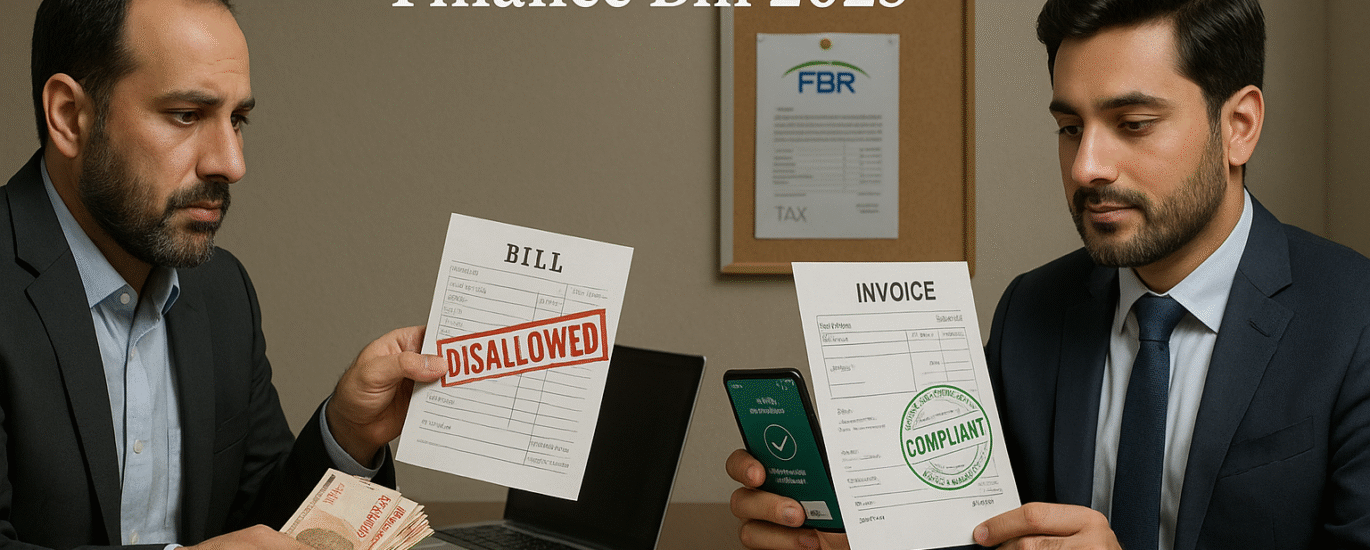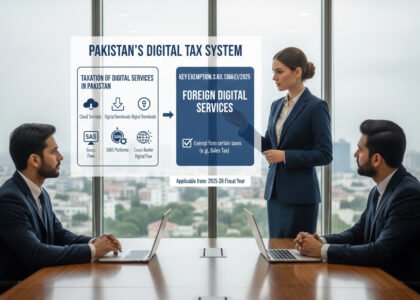The Finance Bill 2025 introduces significant changes to Section 21 of the Income Tax Ordinance, 2001, aiming to discourage undocumented transactions and enforce digital/banking payment compliance. These amendments directly impact the allowability of business expenses, targeting two key areas:
Purchases from unregistered persons (non-NTN holders)
Sales made without banking/digital payment methods
This blog breaks down the updated provisions, explains their scope, and provides answers to frequently asked questions.
📜 Summary of Amendments in Section 21
✅ Clause (q): Disallowance on Purchases from Non-NTN Holders
New Provision:
“Ten percent of the claimed expenditure made attributable to purchases made from persons who are not National Tax Number (NTN) holders shall be disallowed.”
Exceptions:
In case of agricultural produce, the restriction only applies if the purchase is made from a middleman.
FBR may issue exemptions for certain persons or classes through official notification.
Implication:
If a business purchases goods from an unregistered supplier, 10% of that expenditure cannot be claimed as a deduction for tax purposes.
Incentivizes dealing with registered, documented suppliers.
✅ Clause (s): Disallowance for Non-Banking Sales Receipts
New Provision:
“Fifty percent of the expenditure claimed shall be disallowed in respect of sales where the taxpayer received payment exceeding Rs. 200,000 in cash or through non-digital means against a single invoice involving one or more transactions.”
Key Conditions:
Applies to sales or provision of services.
Triggered where payment exceeds PKR 200,000 and is not made through banking or digital channels.
Implication:
If a business receives cash payments exceeding Rs. 200,000 per invoice, half of the related expenses become non-deductible.
Strongly pushes businesses toward formal payment channels.
💼 Practical Scenarios
| Scenario | Disallowance Impact |
|---|---|
| Purchase from a roadside vendor without NTN | 10% of purchase cost disallowed |
| Buying wheat from a farmer directly | Allowed (not a middleman) |
| Buying vegetables via a middleman | 10% disallowed |
| Receiving Rs. 300,000 in cash for a single sale | 50% of expense related to that sale disallowed |
| Receiving Rs. 150,000 in cash for sale | No disallowance (below threshold) |
| Payment received via online bank transfer | Fully allowed |
🧾 Policy Objective Behind the Amendments
These changes reflect a compliance-oriented tax policy aimed at:
Curbing cash-based, undocumented transactions
Encouraging use of banking and digital systems
Incentivizing supplier registration (NTNs)
Enhancing FBR’s audit trail and transparency
✅ 20 Frequently Asked Questions (FAQs)
Q1: What is Section 21 of the Income Tax Ordinance, 2001?
A: It outlines expenditures that are not allowable for tax deduction when computing taxable business income.
Q2: What’s new in clause (q)?
A: Now, 10% of purchase expenses from non-NTN holders are disallowed unless the seller is a farmer, not a middleman.
Q3: Who is considered a middleman?
A: An intermediary who buys produce from farmers and resells to businesses, usually without value addition.
Q4: What happens if I buy from a non-NTN holder but it’s a small vendor?
A: Still subject to 10% disallowance, unless the vendor falls under an FBR exemption.
Q5: What is the logic behind the 10% disallowance?
A: To encourage documentation and registration of vendors.
Q6: Are there exemptions to clause (q)?
A: Yes, the FBR may notify exemptions for specific persons or sectors.
Q7: What is clause (s)?
A: It disallows 50% of expenses related to sales where payment exceeds Rs. 200,000 in cash or non-digital form.
Q8: Does this apply to multiple invoices?
A: The restriction applies per invoice, even if it includes multiple items or transactions.
Q9: Are cheques acceptable under clause (s)?
A: If cleared through the banking channel, yes. Otherwise, non-cleared cheques may fall under disallowance.
Q10: What is considered “digital means”?
A: Bank transfers, debit/credit card payments, mobile wallets, Raast payments, etc.
Q11: Can businesses restructure invoices to avoid this?
A: Artificial splitting of invoices may be treated as tax avoidance and challenged during audits.
Q12: What if a customer insists on paying in cash?
A: The law places responsibility on the seller, so disallowance will still apply.
Q13: Does clause (s) apply to service providers too?
A: Yes, it applies to sale of goods and provision of services.
Q14: Will FBR issue further rules?
A: Possibly, through SROs or clarifying circulars post-implementation.
Q15: Are small traders affected?
A: If they are registered and filing returns, yes. But informal/unregistered persons may already be outside the system.
Q16: Will this affect ATL (Active Taxpayer List) status?
A: Not directly, but disallowances could impact tax liability and audit exposure.
Q17: Are bank deposits proof of digital receipt?
A: Only if the deposit is linked to customer-originated payment, not anonymous cash deposits.
Q18: Is there any way to avoid clause (s) disallowance?
A: Ensure all sales over Rs. 200,000 are routed through bank or digital channels.
Q19: How will auditors verify this?
A: Through sales ledgers, payment vouchers, bank statements, and invoice reviews.
Q20: When is this effective?
A: Applies from the tax year 2025, upon enactment of the Finance Act.
The 2025 amendments to Section 21 reflect Pakistan’s strategic push toward a documented, digitized economy. Businesses must adapt by:
Ensuring suppliers have valid NTNs
Processing high-value sales through banking/digital channels
Maintaining transparent audit trails
Non-compliance can result in substantial tax disallowances, affecting profit reporting and increasing the risk of audits. Proactive planning and digital integration are now essential for sustainable tax compliance.






